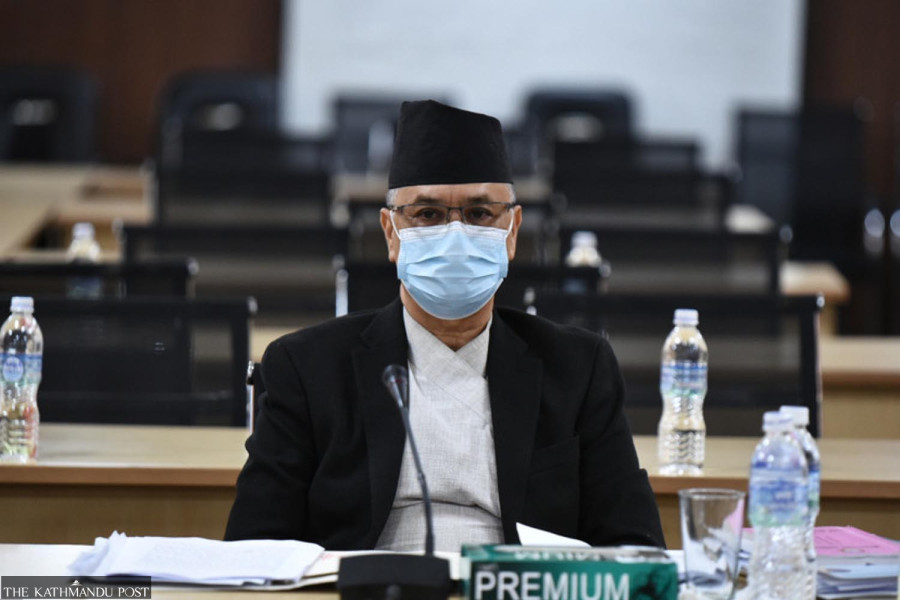National
Impeachment probe likely to linger as election fever grips panel members
The committee has decided to stick to the remaining 32 questions that have been readied for the suspended chief justice to answer. So far, they have asked only 11 questions.
Binod Ghimire
The busy schedule of lawmakers in their electoral constituencies is delaying the probe against suspended Chief Justice Cholendra Shumsher Rana.
The Impeachment Recommendation Committee that started quizzing Rana on Wednesday has managed to ask just 11 questions as of Sunday from the total of 43 questions prepared. It asked four questions to Rana on the first day and just two questions on Thursday. The meeting was then scheduled for Sunday, when the committee members asked additional five questions. The members had agreed not to ask any cross questions and would stick to the set of 43 questions.
The measure, according to the members of the committee, was adopted to save time as the question-answer session was taking a lot of time.
However, this measure too doesn’t seem to be working in concluding the investigation process early because the members of the committee have expedited their activities in their electoral constituencies.
Only eight of the 11-member committee were present at Sunday’s meeting. The next meeting has been delayed by a week until September 11.
“There was no possibility for most of the lawmakers to be present in the meeting before Sunday due to their busy schedule,” Laxmi Prasad Gautam, secretary for the committee, told the Post.
“Most of the lawmakers said they were travelling to their constituencies as the parties are in the final preparations to recommend the candidates for the upcoming elections.”
The parties must submit the closed lists of candidates under the proportional representation system by September 18 and 19. The commission is preparing to call the nominations for the first-past-the-post system on October 8 or 9.
Elections have been scheduled for November 20.
The 11-member committee includes Bishnu Poudel, Lalbabu Pandit, Shiva Maya Tumbahangphe and Krishna Bhakta Pokhrel from the CPN-UML; Min Bishwarkarma and Ram Bahadur Bista from the Nepali Congress; Yashoda Subedi and Rekha Sharma from the CPN (Maoist Centre); Pramod Sah from the Janata Samajbadi Party; Kalyani Kumari Khadka from the CPN (Unified Socialist); and Ekbal Miya from the Loktantrik Samajbadi Party.
“We know we are running out of time but we cannot ignore the fact that the leaders need to visit their constituencies,” Rekha Sharma, a member of the committee from the Maoist Centre, told the Post. “We will expedite the question-answer session from the next meeting.”
The committee had announced earlier that it would prepare its report by Sunday. However, the delay in holding the meetings has made it uncertain when it can complete grilling Rana and prepare its report.
Answering to the queries of the lawmakers on Sunday, Rana defended his verdict to reduce the jail term of former deputy inspector general of the Armed Police Force Ranjan Koirala who was convicted of killing his wife.
The Supreme Court had on July 26, 2020 decided to review a judgment passed by the division bench of Chief Justice Cholendra Shumsher Rana and Justice Tej Bahadur KC to reduce punishment for Koirala, who had been given a life term on the charge of murdering his wife, Gita Dhakal.
A division bench of Rana and Justice Tej Bahadur KC on June 29, 2020 directed the reduction of life sentence, which is 20 years, to eight years and six months. The decision drew widespread criticism with commentators saying the verdict was issued with a malafide intention. Koirala was released on July 23, 2020 following the verdict.
However, a full bench of the Supreme Court in May quashed the verdict by the Rana-led division bench.
Defending his judgement, Rana said he made the decision as per Section 188 of the Muluki Ain which allows the justices to use their conscience while making decisions.
“Koirala’s release was necessary as his children needed guardianship. I used my conscience as per the Muluki Ain with no malafide intention at all,” Gautam quoted Rana as saying. “There has been the practice of using conscience on several occasions. I won’t feel guilty if this is a reason to impeach me.”
Despite Rana’s claim of such conscience in decision-making, the full bench that quashed the decision of the Rana-led bench said: “The decision to use Section 188 of Muluki Ain [by Rana’s bench] seems to be against the principle set by a number of Supreme Court decisions.”




 16.12°C Kathmandu
16.12°C Kathmandu















